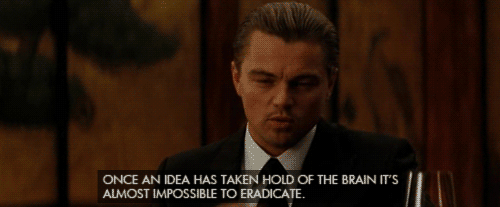30 Days Economics Challenge - 2 - Ideas, bubbles and the world around us
I started my 30 days challenge yesterday, writing about the first brick where economic knolwedge is to be built upon: acting man wanting to improve his or her condition. This is what make us all the same, at least when we act on purpose. Today I'll add some notes on how this action is affected by simple yet invincible ideas.

Everyone has different goals and performs in different actions to achieve them. But even when we agree on what to achieve - things like wealth, success, happiness - we have a lot of conflicting ideas on how to do that.
I’ll tell you a story
When I traveled from Italy to Chile, last winter, my flight had connection in Houston. Mexico and Texas were in those days hit by hurricanes, my flight got cancelled and I had to find an hotel for the night. A guy, Jarod, traveling to California was in my same situation and we decided to share an hotel room to save money (the airlines didn’t refund for extreme weather conditions). Jarod told me he was ending his university course in medicine and I discovered that he had a 250,000 US$ debt. “That’s how I paid for university” he said “And it will take me many years to repay it as my initial wage will not be impressive as you may think”.
250K US$ is actually a small fraction of the currently 1,3 trillion US$ total American college debt. What has been dubbed “the college bubble” presents some incredible aspects, and not just in the US. Students are accumulating huge amounts of debt to acquire a degree that will pay little less than not having it – a choice that doesn’t make economic sense. As unemployment and part-time hours affect the first years of work, many expect that debt not to be repaid. That’s because, in US and in many developed countries, having a college degree doesn’t mean the same it meant one generation ago.
Having a college degree is good for you, having a college degree is good for you, having a college degree is good for you
There are many causes behind the college bubble, like easy money, government programs, but the root is in student’s head, and it’s a simple idea: “having a college degree is a good thing”. This belief may be connected with the idea of material success: finding a job, earning a good wage, buying a house and a car. But it may also reflect your whole idea of success in life: many people think that you are smarter if you earned a degree from a good university. “Having a college degree is a good thing” is an idea that may be fed by parents and teachers and that many students didn’t put into discussion. Probably it was easier for them to accept this idea than finding their own path to conomical success and personal realization.
Ideas shape the world and the economy around us
Ideas fooled an entire generation into a college bubble. Ideas drive human action far more then economic interest. The probably most known economist of the twentieth century, John Maynard Keynes, closed his major work -The general theory of employment, interest, money – writing:
“the ideas of economists and political philosophers, both when they are right and when they are wrong are more powerful than is commonly understood. Indeed the world is ruled by little else. Practical men, who believe themselves to be quite exempt from any intellectual influences, are usually slaves of some defunct economist. […] I am sure that the power of vested interests is vastly exaggerated compared with the gradual encroachment of ideas […] soon or late, it is ideas, not vested interests, which are dangerous for good or evil”.
Challenge your ideas to build a better economy
Economic debates mirror inexorably ideas individuals have about economics. They tell that’s enough repeating a lie thousands of time before it becomes a truth. Economic debates are full of fallacies, that is to say illogical arguments that became so common that are never challenged. Henry Hazlitt started “Economics in one lesson”, a classic in economic education after selling more than a million of copies in the United States, saying:
“Economics is haunted by fallacies than any other study known to man. This is no accident. The inherent difficulties of the subject would be great enough in any case, but they are multiplied a thousandfold by a factor that is insignificant in, say, physics, mathematics, medicine – the selfish pleading of special interests”.
In the last century the importance of ideas on economics has been neglected, in favor of a “scientist” method where “numbers” where more important than “ideas”; it’s easier to study individuals with a set of quantitative variables – numbers - than by analyzing their ideas. Some studies analyzed the output of economic research and highlighted how often editors' or authors' political ideas (these can be documented by their signing and contributions to electoral campaigns) determine the output of their research and the direction of their recommended policies.
Today, an overturning in our way of looking economics require putting into discussion our basic, deeper ideas about economics. Those are actually the ones that influence all the rest; ideas like scarcity and necessity. More on this to come soon.
This is @cryptofarmer and you can find verification for me here.
Follow my 30 days writing challenge!
1. What is economics about
Economics, it is said, in its rationalistic prepossessions assumes that men aim only or first of all at material well-being. But in reality men prefer irrational objectives to rational ones. They are guided more by the urge to realize myths and ideals than by the urge to enjoy a higher standard of living.
Mises, Human Action: a treatise on Economics